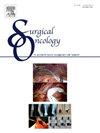Implementation of enhanced recovery after surgery in breast reconstruction: Lessons from a French tertiary center
IF 2.4
4区 医学
Q3 ONCOLOGY
引用次数: 0
Abstract
Introduction
Enhanced Recovery After Surgery (ERAS) programs have significantly improved postoperative outcomes across various surgical disciplines. In April 2022, an ERAS protocol tailored for patients undergoing DIEP free flap breast reconstruction was implemented at the Bordeaux Cancer Center, France. This study aimed to assess the impact of this protocol on length of stay (LOS), complication rates, and compliance with protocol items.
Material and methods
A retrospective pre-post observational study was conducted, including 56 consecutive patients who underwent DIEP flap reconstruction at the Bergonié Institute between September 2020 and April 2023. Twenty-eight patients received conventional perioperative care, while 28 patients were managed under the ERAS protocol. Outcomes assessed included LOS, early and 90-day postoperative complications, and adherence to the protocol's 20 key items.
Results
Median LOS was comparable between groups, at 4.5 days pre-ERAS and 5 days post-ERAS (p = 0.52). Early and 90-day complication rates showed no significant differences. The average compliance with protocol items was 14.2 out of 20 per patient, with 35 % of recommendations followed in less than 66 % of cases.
Conclusion
The initial evaluation of the ERAS program showed no significant reduction in LOS or morbidity, primarily due to suboptimal adherence. These findings highlight the importance of optimizing compliance with protocol recommendations to further improve recovery outcomes, reduce LOS and potentially lower overall healthcare costs.
提高乳房重建术后恢复的实施:来自法国三级中心的经验教训
手术后增强恢复(ERAS)项目显著改善了各种外科学科的术后结果。2022年4月,法国波尔多癌症中心实施了为接受DIEP无瓣乳房重建的患者量身定制的ERAS方案。本研究旨在评估该方案对住院时间(LOS)、并发症发生率和方案项目依从性的影响。材料和方法对2020年9月至2023年4月在bergoni研究所连续接受DIEP皮瓣重建的56例患者进行了回顾性前后观察性研究。28例患者接受常规围手术期护理,28例患者接受ERAS方案。评估的结果包括LOS,早期和90天的术后并发症,以及对方案20个关键项目的依从性。结果eras前4.5天和eras后5天,两组间的中位LOS具有可比性(p = 0.52)。早期和90天并发症发生率无显著差异。每20名患者中平均有14.2名患者遵守了协议项目,在不到66%的病例中,有35%的建议被遵循。ERAS计划的初步评估显示,主要由于依从性不佳,LOS或发病率没有显著降低。这些研究结果强调了优化遵守方案建议的重要性,以进一步改善恢复结果,减少LOS,并可能降低总体医疗保健成本。
本文章由计算机程序翻译,如有差异,请以英文原文为准。
求助全文
约1分钟内获得全文
求助全文
来源期刊

Surgical Oncology-Oxford
医学-外科
CiteScore
4.50
自引率
0.00%
发文量
169
审稿时长
38 days
期刊介绍:
Surgical Oncology is a peer reviewed journal publishing review articles that contribute to the advancement of knowledge in surgical oncology and related fields of interest. Articles represent a spectrum of current technology in oncology research as well as those concerning clinical trials, surgical technique, methods of investigation and patient evaluation. Surgical Oncology publishes comprehensive Reviews that examine individual topics in considerable detail, in addition to editorials and commentaries which focus on selected papers. The journal also publishes special issues which explore topics of interest to surgical oncologists in great detail - outlining recent advancements and providing readers with the most up to date information.
 求助内容:
求助内容: 应助结果提醒方式:
应助结果提醒方式:


